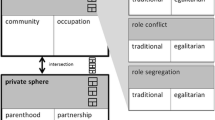Abstract
Undergraduate students from a predominantly white middle class student body who were administered the Desirability of Control Scale in 1980 completed the scale again in 1990. Males scored significantly higher on the scale than females, indicating a higher desire for control, in the initial sample. The males' scores did not differ significantly over the ten-year period. However, the female subjects' scores increased over the course of the decade to a point not significantly different from that of the males. Possible explanations of this effect concern changes in gender role expectations in the 1980's and changes in the women's preference for control following school and career experiences.
Similar content being viewed by others
References
Burger, J. M. (1980).Effectance motivation and the overjustification effect. Unpublished doctoral dissertation, University of Missouri—Columbia, Columbia, MO.
Burger, J. M. (1992).Desire for control: Personality, social and clinical perspectives. New York: Plenum.
Burger, J. M., & Cooper, H. M. (1979). The desirability of control.Motivation and Emotion, 3 381–393.
Eccles, J. S., Buchanan, C. M., Flanagan, C., Fuligni, A., Midgley, C., & Yee, D. (1991). Control versus autonomy during early adolescence.Journal of Social Issues, 47 53–68.
Heft, L., Thoresen, C. E., Kirmil-Gray, K., Wiedenfeld, S. A., Eagleston, J. R., Bracke, P., & Arnow, B. (1988). Emotional and temperamental correlates of Type A in children and adolescents.Journal of Youth and Adolescence, 17 461–475.
Rothbaum, F., & Weisz, J. R. (1989).Child psychopathology and the quest for control. Newbury Park, CA: Sage.
Schonbach, P. (1990).Account episodes: The management of escalation of conflict. Cambridge: Cambridge University Press.
Smith, R. A., Wallston, B. S., Wallston, K. A., Forsberg, P. R., & King, J. E. (1984). Measuring desire for control of health care processes.Journal of Personality and Social Psychology, 47 415–426.
Smith, R. A., Woodward, N. J., Wallston, B. S., Wallston, K. A., Rye, P., & Zylstra, M. (1988). Health care implications of desire and expectancy for control in elderly adults.Journal of Gerontology: Psychological Sciences, 43 P1-P7.
Author information
Authors and Affiliations
Additional information
Reprint requests should be addressed to either Jerry M. Burger at Department of Psychology, Santa Clara University, Santa Clara, CA 95053, or Cecilia H. Solano at Department of Psychology, Box 7778, Wake Forest University, Winston-Salem, NC 27109.
Rights and permissions
About this article
Cite this article
Burger, J.M., Solano, C.H. Changes in desire for control over time: Gender differences in a ten-year longitudinal study. Sex Roles 31, 465–472 (1994). https://doi.org/10.1007/BF01544201
Issue Date:
DOI: https://doi.org/10.1007/BF01544201




